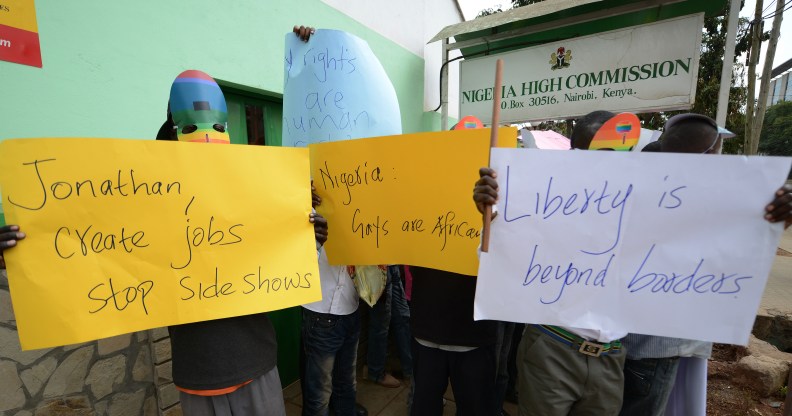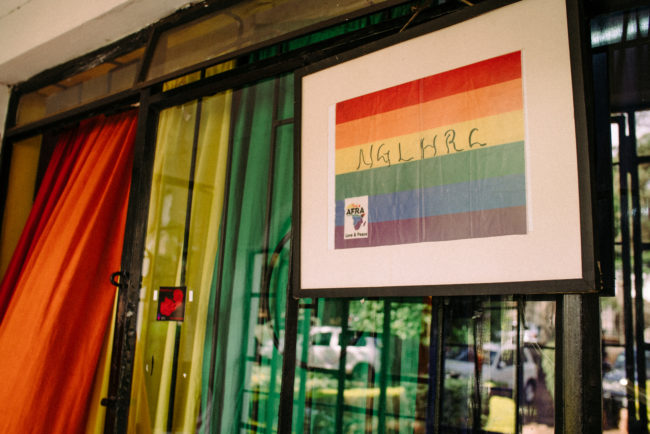Kenya court ruling to decriminalise gay sex is delayed

Kenyan gay and lesbian organisations demonstrate outside the Nigerian High Commission in Nairobi on February 7, 2014. Nigerian President Goodluck Jonathan in 2013 had signed a bill into law against gay marriage and civil partnerships. The Same Sex Marriage (Prohibition) Bill 2013 imposes penalties of up to 14 years’ imprisonment for anyone found to have entered in to such a union. Anyone who founds or supports gay groups or clubs also runs the risk of a maximum 10-year jail term. The legislation, which effectively reinforces existing laws banning homosexuality in Nigeria, has been widely condemned abroad as draconian and against a raft of human rights conventions. AFP PHOTO/SIMON MAINA (Photo credit should read SIMON MAINA/AFP/Getty Images)
Kenya’s High Court has delayed its ruling to decriminalise gay sex in the country.
The High Court had been scheduled to issue its verdict on whether to repeal Sections 162 (a) and (c), 163 and 165 of Kenya’s colonial-era penal code on Friday (February 22).
These parts of the penal code—introduced by the British Empire in 1930—criminalise sodomy, and make sexual acts “against the order of nature,” interpreted as including same-sex sexual relations, punishable by 14 years’ imprisonment.
A new hearing date has been set for May 24.
Judges said they had not yet “finalised” their decision over the lawsuit, citing “administrative challenges and full dockets” as the reason for the delay.
Rebecca Ogembo, a programmes officer at the Gay And Lesbian Coalition Of Kenya (GALCK), one of the petitioners in the case, confirmed to PinkNews that the hearing has been pushed back.
Kenya court room was full, says LGBT activist
“We are feeling disappointed with the system, although the judges say they needed time to prepare because there is a whole lot of papers for this case,” Ogembo told PinkNews.
“The court was full, there was international and local media.
“[Now] we are just preparing ourselves up to May 24.”
“We are feeling disappointed with the system.”
—Rebecca Ogembo, a programmes officer at the Gay And Lesbian Coalition Of Kenya
The National Gay and Lesbian Human Rights Commission (NGLHRC), another petitioner in the lawsuit, posted on Twitter in response to the delay: “To say we are disappointed would be an understatement.”
Eric Gitari, co-founded of NGLHRC, had previously told PinkNews it has been a “long-term, incremental litigation process” to get a hearing set for Friday.

NGLHRC’s office in Nairobi, Kenya. (Emily McCartney)
Nairobi-based journalist Halima Gikandi, who was in the courtroom, wrote on Twitter: “Lots of disappointment in the courtroom as Kenya’s High Court postpones decision on #repeal162 case to decriminalize gay sex.”
There are four human right groups acting as petitioners in the current lawsuit: NGLHRC, GALCK, Nyanza, Rift Valley and Western Kenya Network (NYARWEK) and the Kenya Human Rights Commission.
There are also five individual petitioners, including a lesbian and her mother, and Anglican priest Mark Odhiambo.
Repeal of sections of Kenya’s penal code is about “human rights”
Mercy Njueh, a communications assistant at NGLHRC, previously told PinkNews that Friday’s court ruling was about human rights.
Activists argue that under the penal code any private sexual acts beyond penetrative vaginal sex between a man and a woman is illegal—including anal and oral sex, regardless of the gender of those involved.
“Even heterosexual people, if the law was followed to the very end, would be persecuted,” Njueh told PinkNews.
“What we’re fighting for is not just about gender and sexual minorities. It’s about human rights. We are pushing for Kenyans, who are recognised by the constitution, to be allowed to enjoy their human rights, without having to fear.”

